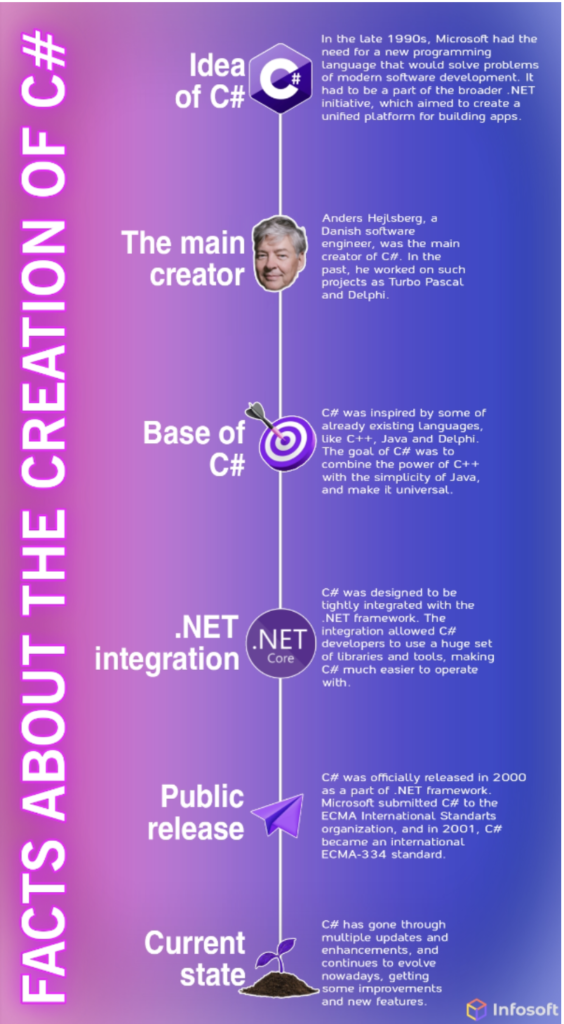Introduction
In our digital world, there are big, huge, even enormous numbers of programming languages. And more of them appear every year. The top-list of the most used and well-known of them is obviously changing all the time, but leaders are always there. And one of them is C# itself. Today, in this article, we will discuss C# as the leading programming language of our time: its creation, history, rise and how it is used. In addition, strong and weak sides of C# will be explored here.
C#, pronounced as C-sharp, was created by Microsoft. Creation of the language was led by Anders Hejlsberg. C# was based on a combination of influences from C, C++, Java, Delphi, and the specific requirements of the .NET framework. The language was designed to be a modern, object-oriented language that provided a balance between power, simplicity, and integration with the broader Microsoft ecosystem. The involvement of Anders Hejlsberg, with his experience in language design, played a crucial role in shaping C# into the language it is today.

In the late 1990s, Microsoft identified the need for a new programming language that would address the challenges of modern software development and leverage the capabilities of the .NET framework. Microsoft assembled a team of experienced language designers, engineers, and developers to work on the creation of the new language. Anders Hejlsberg, a renowned language designer, was appointed as the chief architect of the project. The development team outlined the requirements for the new language, considering factors such as simplicity, productivity, performance, and integration with the .NET framework. They also identified key features and design principles that would guide the development process.
The team drew inspiration from various programming languages, including C, C++, Java, and Delphi. They studied the strengths and weaknesses of these languages to inform the design of C#. Based on the identified requirements and design principles, they began designing the syntax, semantics, and features of C#. Creators focused on creating a modern, object-oriented language that would be easy to learn and use while providing powerful capabilities for software development. The team developed prototypes and conducted iterative design sessions to refine the language design. They evaluated different language features and made adjustments based on feedback from internal and external stakeholders.
Prototypes and conducted iterative design sessions to refine the language design was created by the developers. They evaluated different language features and made adjustments based on feedback from internal and external stakeholders. Concurrently with language design, the team worked on implementing the compiler and development tools for C#. This included building the infrastructure for compiling C# code, generating intermediate language (IL) code, and integrating with the .NET runtime. The development process involved extensive testing and validation to ensure the correctness, reliability, and performance of the language and tools. Automated tests, manual testing, and code reviews were conducted to identify and address issues. In the year 2000, C# was officially released as part of the initial version of the .NET Framework. It was adopted by developers and organizations worldwide for building a wide range of software applications.
The development process involved extensive testing and validation to ensure the correctness, reliability, and performance of the language and tools. Automated tests, manual testing, and code reviews were conducted to identify and address issues. Microsoft submitted C# to the ECMA International standards organization for standardization. In 2001, C# became an international standard (ECMA-334) along with the Common Language Infrastructure (CLI).

Versatility of C#
C# (C sharp) is used in a wide range of industries and application domains due to its versatility and integration with various development frameworks and platforms. Here are ten spheres where C# is used and short pieces of information about its role in them.
- Enterprise Software Development: C# is extensively used in enterprise software development for building applications such as customer relationship management (CRM) systems, enterprise resource planning (ERP) software, and business intelligence (BI) solutions.
- Web Development: C# is widely used for web development, particularly with frameworks like ASP.NET Core and ASP.NET MVC. These frameworks enable developers to build robust, scalable web applications and APIs.
- Desktop Application Development: C# remains a popular choice for building desktop applications, especially for the Windows platform. Technologies like Windows Presentation Foundation (WPF) and Windows Forms are commonly used with C# for creating desktop applications.
- Game Development: C# is a primary language for game development, especially when using the Unity game engine. Unity allows developers to create games for various platforms, including desktop, mobile, consoles, and virtual reality (VR).
- Mobile App Development: With Xamarin, a framework for cross-platform mobile app development, developers can use C# to build mobile applications for iOS, Android, and Windows platforms. Xamarin.Forms allows for code sharing across multiple platforms, reducing development time and effort.
- Cloud Computing: C# is used in cloud computing environments, particularly with Microsoft Azure services. Developers can build scalable and reliable cloud applications using technologies like Azure Functions, Azure App Service, and Azure Storage.
- Data Science and Machine Learning: C# is gaining traction in the field of data science and machine learning with the advent of frameworks like ML.NET. Developers can use C# to build and deploy machine learning models for tasks such as predictive analytics, natural language processing (NLP), and computer vision.
- IoT (Internet of Things): C# can be used in IoT applications, especially when developing applications that interact with devices and sensors. The ability to leverage .NET Core for resource-constrained environments makes it suitable for certain IoT scenarios.
- Financial Services: C# is commonly used in the financial services industry for building trading platforms, risk management systems, algorithmic trading applications, and other financial software solutions.
- Healthcare and Life Sciences: C# is utilized in healthcare and life sciences for developing electronic health record (EHR) systems, medical imaging software, laboratory information management systems (LIMS), and healthcare analytics solutions.
Pros and cons of using C#
Versatility
C# is a versatile language that supports various programming paradigms, including object-oriented, imperative, and functional programming. This versatility allows developers to use C# for a wide range of applications, from desktop software to web development, game development, and more.
Integration of .NET framework
This programming language is tightly integrated with the .NET Framework, which provides a rich set of libraries, tools, and services for building Windows, web, mobile, and cloud applications. This integration streamlines development, improves productivity, and enables cross-platform compatibility.
Type Safety and Memory Management
C# is a statically typed language with strong type safety features. Type errors are caught at compile-time, reducing the likelihood of runtime errors and enhancing code reliability. Additionally, C# includes automatic memory management (garbage collection), which simplifies memory management tasks and helps prevent memory leaks and memory-related bugs.
Productivity Features
C# includes features that enhance developer productivity, such as properties, events, delegates, and LINQ (Language-Integrated Query). These features enable developers to write expressive and concise code, reducing boilerplate code and improving code readability and maintainability. Additionally, C# supports asynchronous programming with the async/await pattern, enabling developers to write responsive and efficient applications.
Platform Dependency
Historically, C# was primarily associated with Windows development, which limited its cross-platform compatibility. Although efforts like .NET Core and .NET 5 have expanded C#'s reach to other platforms, full cross-platform compatibility may still be a consideration in certain scenarios, especially for legacy applications or environments where Windows is not the primary platform.
Learning Curve
For beginners or developers transitioning from other programming languages, the learning curve for C# may be steeper compared to simpler languages. C# incorporates advanced features and concepts, such as asynchronous programming, LINQ, and generics, which may require additional time and effort to master. However, this initial learning investment is often offset by the language's power, productivity, and versatility once proficiency is attained.
In summary, C# remains popular because of its versatility, integration with the .NET ecosystem, strong type safety, productivity features, and robust community support. These factors contribute to its ongoing relevance and widespread usage in software development.
Frequently Asked Questions (FAQ)
Is it easy enough for beginners to deal with? Without any doubt, C# is amazing programming language. It’s very useful in multiple spheres, and combines simplicity of Java and power of its older “sister”, C++. But it can be quite difficult for beginners to start coding with it. Better idea to begin developing with Python or any similar PLs.
Of course not. It’s extreme usefulness still makes C# one of the most used PLs in the world. For example, in 2023, according to the TIOBE Index, C# has clinched the “Programming Language of the Year 2023” title, making remarkable strides and approaching Java.
Sadly, yes. Mainly because of small range of supporting platforms, “50/50” performance and a quite limited number of libraries and plugins, compared with the other PLs.
Infosoft is a team of IT and QA engineers. We provide companies with technical talents and product development experience to create world-class software. You can scale up and down your remote software developing team at any time without any financial risk.


